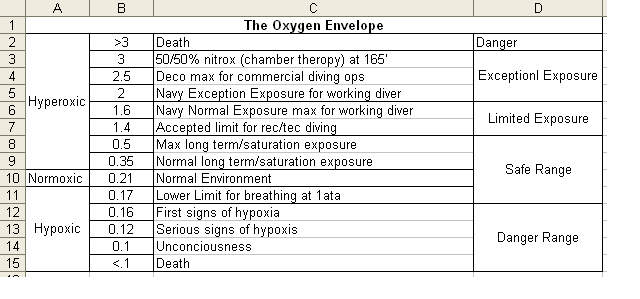
Hypoxia and Diving
#1

Posted 14 October 2008 - 07:51 PM
Has anyone had any experience with Hypoxia or able to impart any knowledge? I did go to DAN and the info that I could find was pretty sparse compared to what I thought it would be. Your imput and experience are greatly appreciated.
#2

Posted 14 October 2008 - 08:22 PM
-JimG
#3

Posted 14 October 2008 - 08:44 PM
the biggest thing on hypoxic mixes your are going to notice first is a numbness in the extremities and lips, and having symptoms progress till you passout due to lack of oxygen to the brain, and death if you keep breathing a hypoxic mix.
as for hyperoxic (mixes greater then 21% used a PPO2 >1.6) you will have similar symptoms to hypoxic but there will be more muscle tremors and at a certain point the brain will short circuit and kick off a seizure.
please clarify as its hard to pinpoint what your bosses concerns are
Tooth
A Novus Dies Has Adveho.... Occupo Dies
Where in the World is Tooth? ... Catch Me It You Can!
Traveling the World, Diving, and Photography, on my days off from saving lives as a Paramedic
#4

Posted 14 October 2008 - 10:26 PM
Hypoxia on a rebreather can occur due to an equipment failure where oxygen is not injected into the breathing loop. However, a diver that is monitoring the equipment properly should notice the declining oxygen content long before it gets to be an issue, and can take corrective measures that will prevent a hypoxic condition from developing. Unfortunately, some do not follow the correct procedures, become complacent (always expecting the equipment to work properly since it normally does so without much effort), stop observing as they should, and die from hypoxia.
Some good resources for finding more out about hypoxia would be Mastering Rebreathers by Jeffrey Bozanic (also sold under the name Understanding Rebreathers), and IANTD's CCR Tek Diving.
"For the diligent diver, closed circuit rebreathers are actually safer than open circuit scuba." Tom Mount
#5

Posted 14 October 2008 - 10:32 PM
#6

Posted 15 October 2008 - 05:50 AM
#7

Posted 15 October 2008 - 06:09 AM
I suspect I did narc myself once on a deep bounce, but no one could tell any difference from my normal behavior.
Finally broken to plow and harnessed to the traces. How may I help you today? Questions welcomed to charlies@singledivers.com
"My secret to maintaining this goofy fašade? It ain't no fašade." - Brad, the
"I don't make up jokes; I just observe Congress and report the facts." - Will Rogers
#8

Posted 15 October 2008 - 08:49 AM
Are you sure you mean hypoxia? Hypoxia is not normally a concern for recreational profiles on air or Nitrox, and you usually don't even start to worry about it unless you are doing deep dives on Trimix. If you could clarify exactly what your boss's concerns are, then I will do my best to address those.
-JimG
Yes, Hypoxia. I mostly ignored him about it for a couple of weeks since I didn't see any validity to the concerns. When he kept bringing it up and requested research I am doing as asked and presenting the results. Still asking questions though since this is a great diversified group that could have insights that would not be published.
please clarify as its hard to pinpoint what your bosses concerns are
Tooth
Dr. "What about hypoxic insult? I'm concerned about Hypoxia with you diving." The statement is general and is very broad range
While I agree that hypoxia is not likely in diving, it has happened with bad/contaminated fills, so here is the answer to your question. As an Air Force pilot I've been trained in an altitude chamber to recognize the symptoms of hypoxia. We have this training because hypoxia is very real threat in military aircraft, especially fighters. The training is accomplished when a pilot first starts training and is reaccomplished every 5 years with annual academic-only refreshers. The training includes academics followed by a chamber ride taking you to 10,000 ft, 25,000 ft and 35,000 ft where you have the pleasure of going off of oxygen to see what happens. At 10,000 ft the symptoms are mild and you can deal with it. At 25,000 ft some people can last several minutes while others go stupid at less than one minute. At 35,000 ft it only takes about 30 seconds or so to be totally out of it. The trick is to recognize the symtoms before you lose the ability to fix the problem. Also, there is what is called a "time of useful consiousness"...in other words there is a point in progressing effect of hypoxia where you are still consious but no longer have the awareness of what is happening and can no longer make decisions or even react to the instructions of others. This is followed shortly thereafter by unconsiousness (which generally equals death when flying a single seat aircraft or diving). Here's the deal on the symptoms...they vary by individual...but some of the more common symptoms are feeling sick to your stomach, light headed, a feeling of ants crawling under your skin, or confusion over normally simple tasks. For me the symptoms were the ants under the skin, but were not very distinct which is actually a bad thing since it means I would have a hard time recognizing the onset of hypoxia. Recognizing hypoxia in others is also a important part of the training, especially for fighter pilots. If your wingman (translate to dive buddy) starts acting strangely such as beaming off in an odd direction or becomes non responsive to input, they may have a problem. Of course this problem could also be narcosis if deep enough. But many of the symptoms and the progression from functioning to non-functioning are probably similar. Hope this helps.
Yes! The majority of the data that I had found related it to altitude diving and not sea level. Thanks for your insight and explanations, it worked well for my brain.
Could your non diving boss have confusion between "shallow water blackout" hypoxia from free diving and scuba diving???
I wish it had been that simple.....No, we discussed that before as his son does a lot of freediving.
Some good resources for finding more out about hypoxia would be Mastering Rebreathers by Jeffrey Bozanic (also sold under the name Understanding Rebreathers), and IANTD's CCR Tek Diving.
Thanks!! I'll check that out just for the info and education.
I know it is very broad and I am very appreciative of the sharing everyone is doing with this. This morning when I came in and we had about 2 minutes of discussion he appears to be more relaxed but still has not given a truly defintive reason/basis of why this has been on his mind.
#9

Posted 15 October 2008 - 09:40 AM
What is his medical specialty?
#10

Posted 15 October 2008 - 09:43 AM
While I agree that hypoxia is not likely in diving, it has happened with bad/contaminated fills, so here is the answer to your question. As an Air Force pilot I've been trained in an altitude chamber to recognize the symptoms of hypoxia. We have this training because hypoxia is very real threat in military aircraft, especially fighters. The training is accomplished when a pilot first starts training and is reaccomplished every 5 years with annual academic-only refreshers. The training includes academics followed by a chamber ride taking you to 10,000 ft, 25,000 ft and 35,000 ft where you have the pleasure of going off of oxygen to see what happens. At 10,000 ft the symptoms are mild and you can deal with it. At 25,000 ft some people can last several minutes while others go stupid at less than one minute. At 35,000 ft it only takes about 30 seconds or so to be totally out of it. The trick is to recognize the symtoms before you lose the ability to fix the problem. Also, there is what is called a "time of useful consiousness"...in other words there is a point in progressing effect of hypoxia where you are still consious but no longer have the awareness of what is happening and can no longer make decisions or even react to the instructions of others. This is followed shortly thereafter by unconsiousness (which generally equals death when flying a single seat aircraft or diving). Here's the deal on the symptoms...they vary by individual...but some of the more common symptoms are feeling sick to your stomach, light headed, a feeling of ants crawling under your skin, or confusion over normally simple tasks. For me the symptoms were the ants under the skin, but were not very distinct which is actually a bad thing since it means I would have a hard time recognizing the onset of hypoxia. Recognizing hypoxia in others is also a important part of the training, especially for fighter pilots. If your wingman (translate to dive buddy) starts acting strangely such as beaming off in an odd direction or becomes non responsive to input, they may have a problem. Of course this problem could also be narcosis if deep enough. But many of the symptoms and the progression from functioning to non-functioning are probably similar. Hope this helps.
I imagine that this exercise is/was similar to that in the movie "An Officer and a Gentleman" in the chamber where they did simple tasks, to learn what their symptoms of hypoxia would be.
#11

Posted 15 October 2008 - 11:12 AM
Being an Officer, and accused of being a gentleman, I can validate your imagination.I imagine that this exercise is/was similar to that in the movie "An Officer and a Gentleman" in the chamber where they did simple tasks, to learn what their symptoms of hypoxia would be.
I found it fun - especially to watch. One other neat thing was positive pressure breathing, where the PPO2 at altitude is so low, you must breath O2 at a high pressure - not fun at all - it takes a lot of work to exhale. I can't remember now, but I think we did that at 40 or 45k feet in the chamber. Useful consciousness at that altitude was like 5-10 seconds.
The early symptoms of hypoxia for me are similar to narcing... a mellowing out and relaxed attitude. Motor skills went quickly as well. Forget analytical thinking, so it is exceptionally dangerous to me as I have a feeling of well-being.
I'm having trouble thinking where this would be an issue for a rec diver, except for the possibility of a bad fill that was hypoxic. More likely is a CO contaminated fill IMHO, and again different symptoms - like green fingernails.
Jacques Yves Cousteau
#12

Posted 15 October 2008 - 11:44 AM
Air Force Hypoxia Video
"For the diligent diver, closed circuit rebreathers are actually safer than open circuit scuba." Tom Mount
#14

Posted 15 October 2008 - 07:27 PM
I imagine that this exercise is/was similar to that in the movie "An Officer and a Gentleman" in the chamber where they did simple tasks, to learn what their symptoms of hypoxia would be.
[/quote]
It is similar except that if you freak out the way one of the individuals did...you would be disqualified from flying
Edited by techintime, 15 October 2008 - 07:27 PM.
#15

Posted 15 October 2008 - 07:49 PM
I think what your boss is referring to is a SAMBA or shallow water blackout from freediving is what he is referring to as a hypoxic insult. In normal recreational open circuit diving your not going to run into a problem with hypoxia.
If this is on your boss/doctors mind give him the medical question line for DAN and have him talk to the medics and they can get him the information he is looking for. 1-800-446-2671 or 1-919-684-2948, Mon-Fri, 9am-5pm (ET) for non emergancy medical questions
wiki link
http://en.wikipedia...._water_blackout
Tim
Thanks for the chart thats laid out at little better then the chart i have at work in my clipboard.
Tooth
A Novus Dies Has Adveho.... Occupo Dies
Where in the World is Tooth? ... Catch Me It You Can!
Traveling the World, Diving, and Photography, on my days off from saving lives as a Paramedic
0 user(s) are reading this topic
0 members, 0 guests, 0 anonymous users




















